Wednesday, 15 May 2013
Welcome to Naija Gist: Israeli military: Syrian rockets hit Golan Heights...
Welcome to Naija Gist: Israeli military: Syrian rockets hit Golan Heights...: Israeli military: Syrian rockets hit Golan Heights Several rockets landed early Wednesday in the Hermon area of the northern Israeli-...
Welcome to Naija Gist: BlackBerry launches low-cost Q5 phone
Welcome to Naija Gist: BlackBerry launches low-cost Q5 phone: BlackBerry launches low-cost Q5 phone The new BlackBerry Q5 is aimed at countries where smartphone use hasn't yet reached a saturat...
Welcome to Naija Gist: Someone's about to win $10,000 in App Store cash
Welcome to Naija Gist: Someone's about to win $10,000 in App Store cash: Someone's about to win $10,000 in App Store cash Apple has a live countdown ticker on its iTunes Web page. Sometime very...
Welcome to Naija Gist: Gigabytes to go: Choosing the right mobile compute...
Welcome to Naija Gist: Gigabytes to go: Choosing the right mobile compute...: Gigabytes to go: Choosing the right mobile computer Pick the ultrabook or tablet that works, or plays, the way you do. (Money Mag...
Welcome to Naija Gist: Hong Kong calls on Bangladesh to fill domestic hel...
Welcome to Naija Gist: Hong Kong calls on Bangladesh to fill domestic hel...: Hong Kong calls on Bangladesh to fill domestic helper shortage Hong Kong is facing a shortage of foreign domestic helpers from the r...
Welcome to Naija Gist: Syrian rebel cuts out soldier's heart, eats it
Welcome to Naija Gist: Syrian rebel cuts out soldier's heart, eats it: Syrian rebel cuts out soldier's heart, eats it Shocking video alleges atrocity in Syria (CNN) -- The ghastly video ...
Welcome to Naija Gist: Anonymous bidder pays $610,000 for coffee with App...
Welcome to Naija Gist: Anonymous bidder pays $610,000 for coffee with App...: Anonymous bidder pays $610,000 for coffee with Apple's Tim Cook A cup of coffee with Apple CEO Tim Cook cost one lucky (...
Anonymous bidder pays $610,000 for coffee with Apple's Tim Cook
Anonymous bidder pays $610,000 for coffee with Apple's Tim Cook

A cup of coffee with Apple CEO Tim Cook cost one lucky (!) bidder $610,000. We hope it's worth it.
An anonymous bidder paid $610,000 to chat over coffee with Apple's chief executive, according to online-auction site Charity Buzz, which began accepting bids about three weeks ago.
Tuesday's winning bid
came only several minutes before the auction closed at 4 pm ET. The
auction site had valued the meeting with Cook at $50,000.
Proceeds from the auction will go to The RFK Center for Justice and Human Rights, an international nonprofit founded as a memorial to Robert F. Kennedy by his family and friends.
The auction saw 86 bids, many of them from companies that do business (or want to do business) with Apple.
The coffee chat will
happen at Apple's Cupertino, California, headquarters. The winner may
bring along one guest. Travel and lodging for the visit, which will last
between 30 minutes and an hour, are not covered.
Visitors will be required
to sign a nondisclosure agreement and are subject to a security
screening. Also, they can't liveblog or tweet during their meeting.
The move fits in with the more open public persona
Cook has adopted since replacing late Apple CEO and co-founder Steve
Jobs. In the past 18 months Cook has met with members of Congress on
Capitol Hill and toured factories in China that make Apple products.
By some measures, a
$600,000 coffee meeting with the chief of the world's leading tech
company might be a bargain. An anonymous bidder paid $3.4 million last year for lunch with star investor Warren Buffett.
Gigabytes to go: Choosing the right mobile computer
Gigabytes to go: Choosing the right mobile computer
 Pick the ultrabook or tablet that works, or plays, the way you do.
Pick the ultrabook or tablet that works, or plays, the way you do.
(Money Magazine)
You may own a laptop, but do you really want to lug it very far? To find a device you can actually tote every day, focus on what your new gadget should do best.
DESKTOP POWER THAT FITS IN YOUR BAGCost: $750; 4GB memory, 500GB hard drive
Size: 9.3 inches tall, 13.4 inches wide
How it excels: At 0.78-inch thick and less than four pounds, the Envy qualifies as an "ultrabook," the featherweight laptops that now make up 28% of the notebook market, says researcher IHS iSuppli.
The Envy has a seven-hour battery, one HDMI and three USB ports, and, for an extra $20, a backlit keyboard. Windows 8 fans will like its touchscreen, which lets you navigate with the swipe of a finger.
THE BASICS, FAST
Samsung Chromebook
Cost: $249; 2GB memory, 16GB hard drive
Size: 8.1 inches tall, 11.4 inches wide
How it excels: The 2.4-pound Chromebook runs only a web browser and apps, keeping it light and zippy, but unlike most Internet-centric devices, it has a full-size keyboard for comfortable typing.
Related: HTC One: An Android phone that works as good as it looks
The device requires a Google account and Wi-Fi for most tasks, though some programs, like word processing, can be used offline. You get 100GB of online storage free for two years, then for $5 a month.
BUSINESS-READY TABLET
Microsoft Surface Pro
Cost: $899 for 64GB
Size: 6.8 inches tall, 10.8 inches wide
How it excels: Road warriors like tablets for cramped planes and passing around in meetings, but most slates aren't designed for getting work done. This two-pounder, though, can handle PowerPoint and spreadsheets.
Someone's about to win $10,000 in App Store cash
Someone's about to win $10,000 in App Store cash

Apple has a live countdown ticker on its iTunes Web page.
Apple will give the lucky
downloader a $10,000 App Store gift card. The next 50 people to
download an app after that will each receive a $500 gift card.
If you're curious to see when this might happen so you can take a shot at winning, Apple has a live countdown ticker
on its iTunes Web page. However, it's hard to say how accurate the
counter is or how much the rate of downloads may accelerate as the goal
gets near.
The promotion is yet
another reminder of the massive success of Apple's App Store, which
opened in 2008, added to the appeal of the iPhone and spawned many bad
"there's an app for that" headlines. It also inspired online app stores
by Google, BlackBerry and other companies.
The contest is open to entrants 13 or older in a country where the App Store is available. People also can enter without downloading an app by filling out an online form.
This will mark the second time in three months that Apple has celebrated an iTunes milestone. In February, Phillip Lupke of Germany received a 10,000 euro (about $13,528) iTunes gift card for downloading the 25 billionth song.
How massive a number is 50 billion? According to Apple, counting to 50 billion would take a person 1,600 years.
BlackBerry launches low-cost Q5 phone
BlackBerry launches low-cost Q5 phone
 The new BlackBerry Q5 is aimed at countries where smartphone use hasn't yet reached a saturation point.
The new BlackBerry Q5 is aimed at countries where smartphone use hasn't yet reached a saturation point.BlackBerry on Tuesday unveiled the Q5, a lower-cost, brightly colored smartphone aimed at emerging markets.
"I know this is going be a big hit," said CEO Thorsten Heins, who showed off the device at the BlackBerry Live conference in Orlando.The Q5 will be available in multiple colors, including black, white, red, orange and pink. It will go on sale starting in July in "selected markets" in Europe, the Middle East, Africa, Asia and Latin America. Neither Heins nor BlackBerry's press release mentioned pricing for the Q5.
BlackBerry (BBRY) is struggling to regain share lost to Apple (AAPL, Fortune 500) and Samsung in some Western markets -- namely, the United States -- but the company sees a major opportunity in countries where smartphone use hasn't yet reached saturation levels. The Q5 is aimed squarely at those regions.
Israeli military: Syrian rockets hit Golan Heights
Israeli military: Syrian rockets hit Golan Heights
Several rockets landed early Wednesday in
the Hermon area of the northern Israeli-held Golan Heights, on Israel's
border with Syria, the Israeli military said.
"Initial reports indicate
that the rockets are a result of (the) domestic situation in Syria," a
spokeswoman for the Israel Defense Forces said.
"As a result the Hermon side of the mountain will be temporarily closed for visitors."
Hong Kong calls on Bangladesh to fill domestic helper shortage
Hong Kong calls on Bangladesh to fill domestic helper shortage
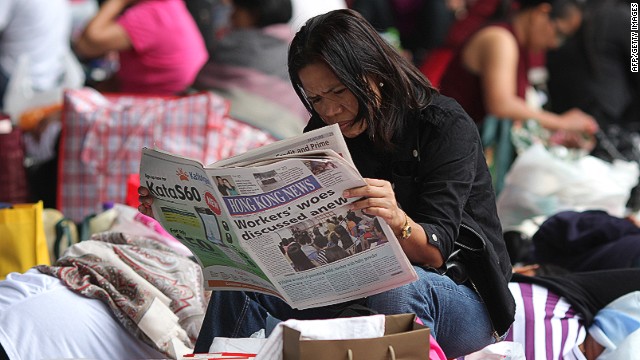
Hong Kong is facing a shortage of foreign domestic helpers from the region
More than 290,000 foreign
domestic helpers -- mainly Indonesians, Filipinas and Thais - live and
work in the special administrative region of Hong Kong, according to
Hong Kong's Department of Immigration.
But fears that Indonesian
plans to wind up the foreign export of its low-skilled workers by 2017
will lead to a shortage of cheap hired help has the city's employment
agencies looking elsewhere in the region.
This week Hong Kong
received its first batch of domestic helpers from Bangladesh, a country
that agencies hope will provide a rich source of women willing to work
in a foreign country for just $HK3,920 ($505) a month.
"There are not enough
Filipino and Indonesian domestic helpers these days," said Teresa Liu
Tsui-lan, the managing director of the Technic Employment Service
Centre. "We have a good training course for them in Bangladesh over
three months where they learn Cantonese and Chinese cooking.
"We think that employers will be able to accept that," she told CNN.
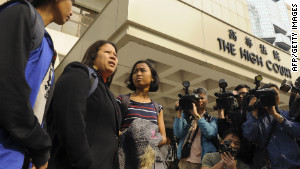
Hong Kong maids vow to fight court ruling
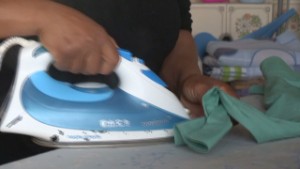
Equality for Brazil's domestic workers

Keeping world's highest hotel clean
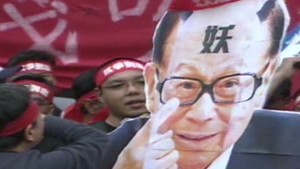 Why are Hong Kong dockworkers striking?
Why are Hong Kong dockworkers striking?
She said there was now a
lot of competition from other countries -- mainly Singapore, Malaysia
and Taiwan -- for Indonesian maids, making it harder for Hong Kong to
recruit them.
"Even though the salary
offered in Hong Kong is higher, these countries are a lot closer to
Indonesia so it's easier for domestic helpers to return home when they
need to," Liu said.
She said Indonesian
maids were in demand as carers for the elderly because, with limited
English skills, their Cantonese has a tendency to improve quickly.
Filipinas, by contrast,
who often have high levels of English before they come to Hong Kong,
normally rely on English to communicate with their Hong Kong employers,
she said.
Another 75 Bangladeshi
workers will arrive in Hong Kong over the next three months, followed by
150 to 200 every month after that.
There are currently just
71 Bangladeshi domestic helpers in Hong Kong, compared with 152,557
Indonesian and 149,009 Filipino domestic helpers in the city, according
to 2012 figures from the Department of Immigration.
The Bangladeshi helpers
said they paid an agency in Bangladesh about $HK13,000 - more than three
times their monthly salary - to apply for the job in Hong Kong.
One of the helpers,
Khadiza Akter, 24, who is married with a son, told a press conference in
Hong Kong that she planned to work in the city for five years.
"My husband is a driver
and I want to buy another car for him so that we can start our own
business," she said. "I also want to give my son a better education."
Indonesia's Manpower and
Transmigration Minister Muhaimin Iskandar last year announced the
country planned to stop sending domestic workers abroad from 2017. While
the government has no authority to prevent people from seeking work
abroad, he said workers would have to have a clearly defined position
and working status before taking up a foreign job.
"The recipient country
would have to recognize them as formal workers with certain rights, such
as working hours, the right to holidays and leave as well as to a set
salary," Iskandar told the Jakarta Globe.
While Hong Kong has
strong laws in place to protect the legal minimum wage of $HK3,920
(U.S.$505) a month, domestic helpers are sometimes subject to abuses
such as long working hours, sub-standard living and sleeping
arrangements and employers that attempt to cut deals to pay below the
legal minimum.
Indonesia slapped
moratorium on domestic workers to Malaysia in 2009 after multiple cases
of abuse there. While the country has since lifted the ban, it only
resumed sending migrant workers after more than a year of protracted
negotiations on protecting the rights of domestic workers in Malaysia.
Indonesia's economy has
shown stellar growth in recent years, expanding 6.02% in the first
quarter of 2013, according to figures from Indonesia's Bureau of Statistics. With jobs available domestically, analysts say many Indonesians were are electing to stay at home.
An Indonesian Business
Forum held in Hong Kong recently outlined the thrust of government
policy, which aims to boost the skill sets of Indonesian foreign
workers, particularly those working in building and construction.
"In five years it will
be a very different situation," Indonesian government economic advisor
Professor Hermanto Siregar told the forum. "These changes are already
happening in the likes of South Korea and Japan. There are many
semi-skilled workers employed there now on much better wages than they
would earn as domestic helpers."
Syrian rebel cuts out soldier's heart, eats it
Syrian rebel cuts out soldier's heart, eats it

Shocking video alleges atrocity in Syria
A man, said to be a well-known rebel fighter, carves into the body of a government soldier and cuts out his heart and liver.
"I swear to God we will
eat your hearts out, you soldiers of Bashar. You dogs. God is greater!"
the man says. "Heroes of Baba Amr ... we will take out their hearts to
eat them."
He then puts the heart in his mouth and takes a bite.
A group loyal to
President Bashar al-Assad posted the video online Monday. The group
describes the mutilation as a "crime that crosses all lines."
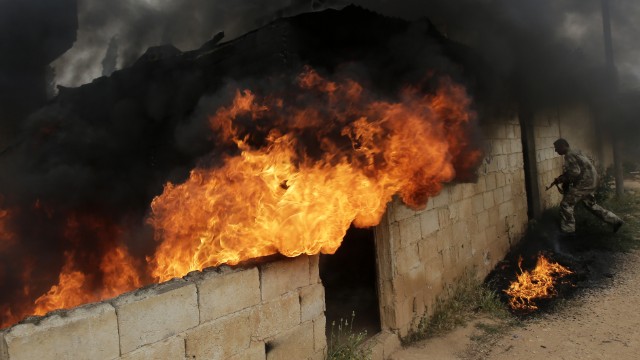 Syrian civil war in photos
Syrian civil war in photos
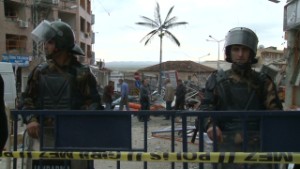
Syria-Turkey border tensions flare

Possible solutions to Syria war
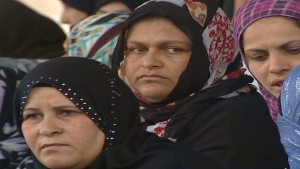
Syria's internally displaced
It's a sentiment shared by the main opposition alliance, which describes the act as "horrific and inhumane."
"The Syrian Coalition strongly condemns this act, if it is revealed to be true," the dissident group said in a statement.
"The coalition stresses
that such an act contradicts the morals of the Syrian people, as well as
the values and principles of the (rebel) Free Syrian Army."
Rebel spokesman: There's more to the story
Although CNN cannot
independently verify the authenticity of the video, CNN has interviewed a
local rebel spokesman who confirmed the incident and said he has spoken
to the man in the footage.
Tariq al Sayed, a
spokesman from the Homs neighborhood of Baba Amr, said he is a friend of
the rebel in the video. He said the incident took place more than two
weeks ago, after several rebels and government troops were killed in a
battle in western Homs.
Al Sayed said when he saw the video, he told his friend to take it off the Internet because the act was so perverse.
"This was an isolated
incident. (His) actions do not represent the FSA. His actions only
represent himself," al Sayed said. "This is not just a normal person who
sits home. He has had two brothers killed. His mom and dad were
detained, and the rest of his family displaced."
The Baba Amr district of
Homs, once a bastion of anti-government sentiment, was subjected to a
brutal counteroffensive by the Syrian army starting in February 2012,
Human Rights Watch said.
Homs came under weeks of relentless attacks by government forces, including indiscriminate shelling on civilian areas.
But the government has
repeatedly denied attacking civilians, saying Syrian forces were
targeting armed gangs and foreign terrorists bent on destabilizing the
government.
Regardless of the horrors suffered in Homs, the atrocious act in the video is inexcusable, Human Rights Watch said.
"It is not enough for
Syria's opposition to condemn such behavior or blame it on violence by
the government," said Nadim Houry, Middle East deputy director at Human
Rights Watch. "The opposition forces need to act firmly to stop such
abuses."
Fowl play? Giant rubber duck drowns in Hong Kong
Fowl play? Giant rubber duck drowns in Hong Kong

Bad night: Rubber duck recreates a scene more familiar in Lan Kwai Fong or Wan Chai.
The 16.5-meter (54 feet)
inflatable sculpture mysteriously lost its mojo overnight, deflated and
bobbed lifelessly in Victoria Harbour.
Organizers called an
urgent duck crisis meeting early Wednesday and didn't respond to
questions about the misfortunes of the duck or whether the deflation was
part of regular maintenance, as reported in some local media. A tweet
did appear however on the official Harbour City Twitter account, saying: "The Rubber Duck needs to freshen up. Stay tuned for its return."
 Gallery: Floating into Hong Kong
Gallery: Floating into Hong Kong
 Quacking up over art display
Quacking up over art display
The duck has captivated
Hong Kong since its arrival earlier this month. News of the duck's
deflation was splashed across Hong Kong media and social networks.
Called "Rubber Duck," it's the product of Dutch artist Florentijn Hofman. After going on show on May 2, it was to be on display until June 9.
Though it's unclear what
happened to the duck, the artist told CNN earlier that the duck was
built locally so it would be easier to fix.
Hong Kong is the latest
port of call for the duck. It's previously taken up temporary residence
in cities all over the world, including Osaka, Sydney, Sao Paolo and
Amsterdam.
The duck hasn't always enjoyed plain sailing. In 2009 during a port call in Belgium, it was stabbed 42 times by a vandal.
"We don't know why the
person did it," Hofman said. "But in the Middle Ages there was a moment
when they ruined all the sculptures in Europe. We call it a "sculpture
storm." The museum that bought the work spoke about 'Sculpture Stormers'
that would hit the work - and kill it."
"But [the incident]
brought the people of that town together. The community had a stake out
at night and protected it and even the police looked after it. It shows
that this piece of art means a lot to people in the vicinity of this
work."
The duck team also closely monitor the weather after the duck copped some nasty treatment during a storm in Belgium.
"There is a crew that
has wind speed meters and they follow what the weather does," Hofman
said. "They monitor by computer and monitor the weather so they can
react in advance because we don't want to cry if it gets ripped up."
For more details on the duck during cheerier times read our earlier report: Hong Kong crazy for giant duck
Japanese politician calls wartime sex slaves 'necessary'
Japanese politician calls wartime sex slaves 'necessary'
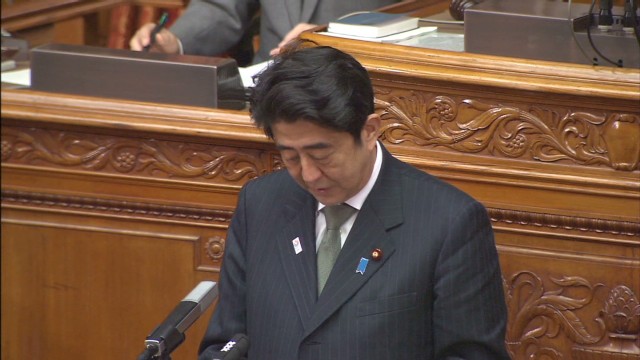
Mayor: 'Comfort women' were necessary
Toru Hashimoto, who
serves as the Mayor of Osaka, told reporters at his weekly press
conference Monday that "anyone would understand" the role of "comfort
women" when soldiers were risking their lives and you wanted to give
them "a rest."
Though he acknowledged
the issue was a "tragic result of war," Hashimoto, who is co-leader of
the nationalist Japan Restoration Party, insisted the use of prostitutes
by soldiers was not unique to Japan.
Bizarrely, Hashimoto also
revealed that he told a U.S. military commander during a trip to a base
on the island of Okinawa that the adult entertainment business in Japan
should be "utilized more" by U.S. personnel.
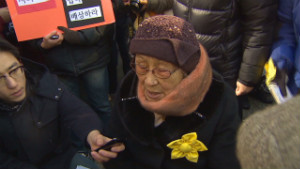
Korean 'Comfort women' demand justice

Ignoring Japan's comfort women
"I told him there are
places that operate within the boundaries of the law which can be used
for releasing sexual frustration, so they [the U.S. military] should
fully utilize it or the marines won't be able to control their
aggressive sexual desires."
He said the officer refused to discuss the suggestion.
Reaction at home
Hashimoto's comments also found little support among political colleagues at home.
"A series of remarks by
Japanese politicians related to our interpretation of [wartime] history
have been misunderstood," Education Minister Hakubun Shimomura told
reporters at his weekly press conference Tuesday. "In that sense Mr.
Hashimoto's remarks came at a bad time. [But] I wonder if there is any
positive meaning to intentionally make such remarks at this particular
moment? As for the remarks about adult entertainment, I could not
believe that it came from a man representing a political party."
Fellow minister Tomomi
Inada asked: "I wonder is this something the representative of a
political party should say? I myself think the comfort women [issue]
infringed the human rights of the women."
Chief Cabinet Spokesman
Yoshihide Suga did not respond directly to Hashimoto's comments but
instead told reporters "the stance of the Japanese government on the
comfort women issue is, as it has been stated repeatedly in the past,
that they suffered unspeakably painful experiences and we keenly feel
the pain when we think about them."
Sex slaves
Many of the 200,000
women whom historians estimate were forced to become sex slaves for
Japan's former Imperial Army were from the Philippines, China and the
Korean peninsula -- all occupied territories at the time. While many
have now died, a group of Korean survivors has spent years protesting
outside the Japanese embassy in Seoul. They demand greater recognition
of their suffering, as well as individual compensation.
They suffered unspeakably painful experiences and we keenly feel the pain when we think about them.
Chief Cabinet Spokesman Yoshihide Suga
Chief Cabinet Spokesman Yoshihide Suga
Tokyo maintains its
legal liability for wrongdoing was cleared by a bilateral treaty signed
in 1965 with South Korea. For its part, the Seoul government expressed
"deep disappointment" over Hashimoto's comments.
"There is worldwide
recognition... that the issue of comfort women amounts to a wartime rape
committed by Japan during its past imperial period in a serious breach
of human rights," a foreign ministry spokesman told Agence France-Presse
Tuesday.
"Our government again
urges Japan's prominent officials to show regret for atrocities
committed during Japan's imperial period and to correct their
anachronistic way of thinking and comments."
In 1993, the Japanese
government released a statement acknowledging the "immeasurable pain and
suffering" endured by thousands of women forced to have sex during
World War II. It even vowed to include the comfort women issue in new
junior high school textbooks for the first time.
But Japan's wartime past
continues to loom over its relations with key Asian neighbors such as
South Korea and China, which are currently strained by territorial
disputes in the region.
Victims endure lives degraded by traffickers
Victims endure lives degraded by traffickers
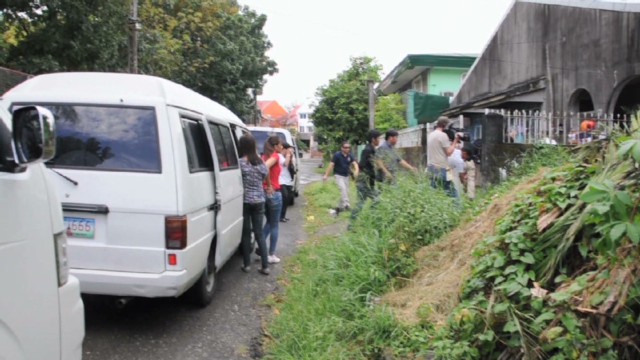
Ride-along on a human trafficking raid
Editor's note: This
article is part of The Fighters, a series of reports from a full-length
film that premieres on CNN International TV on May 17 and 18 at 1900
HKT; 2200 CET; 2200 ET. The documentary is a result of two years of
undercover work and filming in the Philippines.
Manila, Philippines (CNN) -- Birds chirp outside. A
motorcycle groans up a nearby hill. And in a small, warm room filled
with books and framed drawings, a young woman we're calling Maria tears
at a tissue as she prepares to tell how sex traffickers corrupted her
life.
"I was 15 when I was
recruited," she said. "I had to find a job because my father had a lung
problem and I needed to find money so we could send him to the
hospital."
Maria met a person in her province who said he could find her a job in Manila.
"I thought I was going to
work as a dishwasher in a restaurant," she said. "But when I arrived I
realized it was a 'casa.'" 'Casa' is a code word for brothel in the
Philippines.
Many young girls fall
prey to human traffickers. They often leave their homes and villages in
the provinces, seeking opportunities to support their families.
The traffickers are adept at convincing them to travel with them.
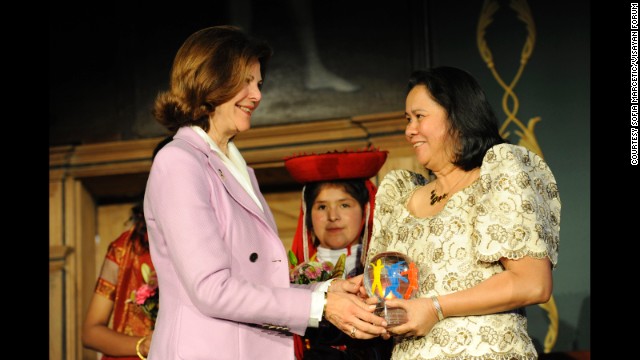 Anti-trafficker attracts power brokers
Anti-trafficker attracts power brokers
 Government: 100,000 sex workers are kids
Government: 100,000 sex workers are kids
"I traveled through the
islands. It took me 24 hours to reach Manila. When I got there, I found
16 girls staying in the same small place. Some were as young as
13-years-old," she said.
Maria was trapped and forced to have sex with a number of foreign and Filipino men.
Although she was there
for only a few weeks before the Filipino police raided the apartment and
freed her and the others, the damage had been done.
Maria routinely saw up
to 13 customers a day. Her captors forced her to go to extreme lengths
to deceive them into thinking she was a virgin in order to command
higher prices.
"We were forced to take a
cotton ball and dip it in pigeon's blood, then put that in our sex
organ," she says. As outrageous as that is, it is not unusual.
In some parts of Asia, anti-trafficking groups have found that men believe sex with a virgin can cure their HIV/AIDS.
Social workers say
that's led to a disturbing trend with tragic consequences for the
victims of human trafficking. UNICEF estimates as many as 100,000
children work in the illegal sex trade in the Philippines.
Orphaned and homeless: Surviving the streets of North Korea
Orphaned and homeless: Surviving the streets of North Korea
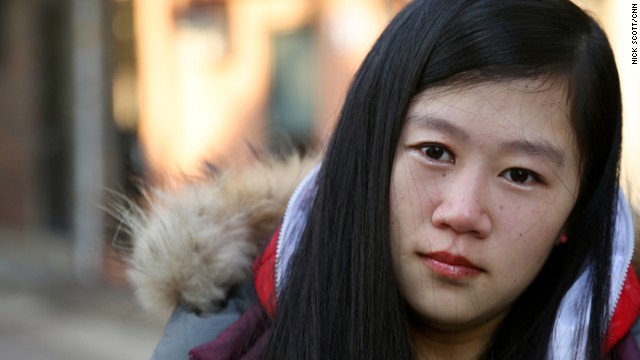
Orphaned and homeless in North Korea
She was born in a village
near North Korea's sacred Mount Baekdu, where the country's lore claims
its founder, Kim Il Sung, led the fight for independence and his oldest
son, Kim Jong Il, was born.
But the similarities between Yoon Hee and her homeland's rulers end there.
Six months after her birth, her parents divorced and left Yoon Hee in the care of a friend.
The second time she was abandoned, Yoon Hee was 8 and had gone back to live with her mother.

Expert: Malnutrition issue in N. Korea
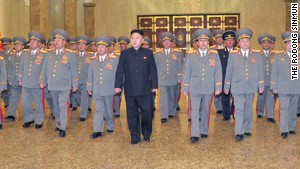
The power of the Kim dynasty
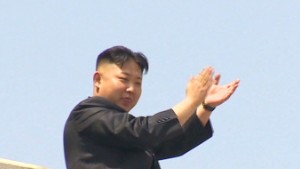
China cuts ties with North Korean bank
 Hyeonseo Lee: My escape from North Korea
Hyeonseo Lee: My escape from North Korea
One day, her mother told her she had somewhere to go. "She never came back," Yoon Hee said.
Yoon Hee had no choice
but to live alone in North Korea. So she did what many abandoned North
Korean children do -- living on the streets, nearly freezing to death in
the winters, begging for mercy, plucking grass for food and crying so
hard at night only the pain in her face could stifle her tears.
Yoon Hee stayed in the same neighborhood as her mother in the city of Hyesan, hoping they could live together again.
"I sometimes ran into her on the streets," Yoon Hee said, "but I couldn't ever get a warm feeling from her."
One time when they met,
Yoon Hee said, "she told me she was already having a hard time living by
herself, so she couldn't live with me."
But Yoon Hee was undeterred.
"I had a hope."
Death by electrocution
Amid tensions in the Korean peninsula, much of the focus has fallen on deciphering the next moves of Pyongyang's new leader, Kim Jong Un.
But all this belies a
humanitarian crisis in North Korea, a country that boasts of its
military strength and nuclear capabilities and yet has no place for
homeless orphans.
"There are many children
like me who die," said Hyuk Kim, who fled North Korea in 2011, nearly a
decade after becoming an orphan.
In the punishing
winters, Hyuk and other orphans would break into sheds containing
electric transformers near factories and markets to find a warm place to
sleep.
"Many children
accidentally end up touching the transformers while sleeping and die,"
said Hyuk, who asked that his real name not be used for the safety of
family members still in North Korea.
As Hyuk dozed off each
night curled next to a transformer, he would try to stay as still as
possible -- willing himself not to move in his sleep.
"I thought I would live forever this way," he said.
Glimpse into the underbelly
The plight of orphans
who've escaped North Korea caught the attention of U.S. humanitarian
groups, who've lobbied for years to pave the way for their adoption by
Americans and others.
In January, President
Obama signed the North Korean Child Welfare Act of 2012, which instructs
the U.S. State Department to "advocate for the best interests of these
children" -- including helping to reunite families and facilitate
adoptions.
The law is aimed primarily at those orphans hiding in China
and other countries. Those who make it to South Korea are provided an
education, a path to citizenship and even a chance at adoption.
Gwak Jong-Moon knows the
pain orphans suffer. He's the principal of Hangyeore Middle-High
School, a South Korean transitional facility open only to North Korean
children and teenagers.
About 50 North Koreans
under the age of 24 enter South Korea every year without family,
according to the South's government. These children only make up about
2% of all North Korean defectors who enter the South.
Some North Korean
orphans who survive the treacherous escape from their homeland by way of
China end up in South Korean boarding schools, dormitories or group
homes.
Adoption in South Korea is not a common practice, but Gwak said "adopting is natural, and worthy."
"There are some South
Koreans who adopt our school's children, although not many," he said.
"Children here with South Korean adults who don't officially adopt, but
act like their parents make unbelievable progress."
We recently traveled to
Seoul to meet some of these orphans and the people caring for them.
Originally we wanted to learn more about their lives in South Korea --
what it's like trying to integrate into an alien society after living in
one of the most isolated countries in the world.
We visited Gwak's school
earlier this year -- on a majestic campus more fitting for a temple,
tucked away in snow-crusted hills about an hour from Seoul. We also
visited the Seoul home of a pastor who is raising five North Korean
orphans.
In both places, we met
children and teenagers scarred by their experiences. Although we could
not independently confirm the details of their individual histories,
advocates who work with them say they have heard consistently similar
testimonies.
We also heard stories of
children struggling with South Korean culture, targeted by bullies,
befuddled by K-pop and puzzled by mundane tasks like managing money and
taking public transportation.
But we also got a
glimpse into the underbelly of the Democratic People's Republic of Korea
-- from the perspective of those who occupied one of the lowest rungs
of society, far removed from the idyllic vision portrayed in the
nation's propaganda.
'I am going to die'
Not long after running
into her mother in the streets, Yoon Hee fell ill. Alone and 10 years
old, she lay in the snow as the icy winter descended in North Korea.
Eventually, Yoon Hee
caught what she suspects was typhoid, leaving her in a hell of fire and
ice. Although she lay in the snow about two weeks, no one offered help
or food.
She tried to muster her
energy to sit and wiggle her fingers and toes, but her hands and feet
barely budged -- they were frozen in place. She could no longer move.
Surely, this was it, Yoon Hee thought. She prepared herself. "I am going to die."
Yoon Hee would become
yet another corpse rotting in the street -- she had seen the frozen
corpses on the roadside because no one bothered to bury bodies of
strangers.
A voice interrupted her feverish daze.
A villager had appeared. Yoon Hee recognized her as a woman who was struggling to feed her own children.
The villager thrust money into Yoon Hee's hand. Her voice was firm: "You have to survive."
Helping defectors escape
In North Korea, homeless
children like Yoon Hee are called "kotjebes," or flowering swallows.
Like the bird, these children are free to roam, unconstrained by the
country's societal norms.
Without parents, family
or schooling, they don't have as much exposure to the state propaganda
that is engrained from childhood, according to advocates. When they
escape to neighboring China, it is not so much for political reasons,
but to find food.
A U.N. assessment in March found that of the country's estimated 28 million people, 16 million are chronically deprived of food.
Peter Jung is among
those working on behalf of North Korea's orphans. Based in Seoul, he
leads Justice for North Korea, which describes itself as a "volunteer,
non-partisan, grassroots organization" that opposes human rights
violations in North Korea.
Jung first met North Korean orphans in 1998 in northern China, where he had gone to learn Mandarin.
Jung was stunned to see
the stunted size and condition of North Korean orphans. "It was too
shocking to believe," Jung said. "There were children who had skin
diseases and with bloated stomachs, collapsing in the streets because of
malnutrition."
Korean children have
been found to be about 3 to 4 centimeters shorter than their South
Korean counterparts, according to a 2009 study published in the journal Economics and Human Biology.
Nearly 28% of North
Korean children suffer from stunting, according to the U.N. Office for
the Coordination of Humanitarian Affairs.
Fifteen years after
meeting the first of these street orphans, Jung is still helping
defectors escape, working from a small, cluttered basement office in the
South Korean capital.
'Hugs and comforts'
For a decade in North
Korea, Yoon Hee roamed the streets, slept in crevices and picked rice
off the ground that people had dropped.
"I appreciated every single grain of rice," she said.

Sister baffled by North Korea punishment

Why is North Korea cooling it?

China's influence in the N. Korea crisis

North Korea's reluctance to talk
Every night, she had the same concern: "Where am I going to sleep tonight? How can I survive?"
In Ryanggang province where she lived, the average monthly temperature can fall below freezing during the winter months, according to the World Food Programme.
Yoon Hee learned
survival skills fitting of "The Hunger Games" -- where to scavenge for
food, where to sleep, how to stay warm, how to keep safe. She curled
into a fetal position in a nook under the windows of houses.
"Sometimes, I wrapped my feet with a plastic bag because it was too cold."
She slept alone, except for her thoughts of her mother.
"When I almost was
starved or freezing to death, the only things I wanted from her were
hugs and comforts. I thought that was happiness."
But she couldn't recall a single hug from her mother.
Surviving in a new home
Hyuk lost his mother when he was 6, then his father when he was 11.
After his father died,
he lived with a group of six other orphan boys in North Hamgyong
province, located at the northern most tip of the country.
"We started a fire
together, but we still couldn't sleep because it was so cold," he said.
"We just warmed ourselves with the fire at night and we mainly slept
during the day when the sun was shining.
"During the night, we needed to find food to eat. We sometimes stole food from others and gathered food from here and there."
When something went
missing in the neighborhood, the blame automatically fell on Hyuk and
his friends, even when they had not been involved. The children would be
taken to the police station and tied to chairs, he said.
"The police would then
automatically accuse us of stealing because they assume we would have
stolen since we don't have parents. They hit us, tie us up, and torture
us. There was no one to defend us."
Hyuk, now 21, attends
Hangyeore Middle-High School, where he sleeps in a bed inside a heated
dormitory. The school serves three warm, buffet-style meals a day, and
students can pile as much food as they'd like on their metal trays.
In the school's
hallways, girls with sleek black hair and boys with long sweeping bangs
are busy texting and taking pictures of themselves on their phablets -- a
combination smartphone and tablet. Their crisply ironed school uniforms
would not be out of place at an English or American boarding school.
It's a vastly different
scene than the childhood Hyuk describes. The blur of hunger, cold and
countless police beatings has been replaced by soccer and basketball.
The school, set up by the South Korean government, does not charge tuition.
The North Korean orphans
who escape to South Korea often struggle to catch up in a competitive
environment where their counterparts have had years of schooling and
private tutoring.
While acknowledging hardships adjusting in South Korea, Hyuk said: "I am very comfortable, because I can openly say anything."
He's anxious about what he'll do after he graduates from the school -- maybe he'll go into operating forklifts, Hyuk said.
A mop of shaggy bangs falls over his round face as Hyuk sits atop a table, his legs swinging freely.
"I can eat, live, and survive here."
Scars from trauma
Most North Koreans
escape by crossing the river on the northern border to China. Some
street children who flee to China become easy prey to traffickers,
according to human rights activists.
The girls are sold into
the sex trade, or as wives for rural Chinese men. The young boys are
sold as sons into Chinese families who have not been able to produce
one, said Jung of Justice for North Korea.
China sends back those escapees they catch, so defectors live in hiding -- fearing they'll be imprisoned and tortured back home.
That fear can continue long after escapees have made it to South Korea.
In the home of pastor
Daniel Park, we met a 13-year-old boy whose mother took him to China
when he was a year old. The mother was caught and repatriated to North
Korea, but the boy remained in China, where he was beaten and abused,
Park said.
In Park's Seoul home,
the trauma showed. The boy, sporting a buzz cut, was skittish and jumpy
around strangers and followed Park closely around the house. During
mealtimes, when his foster family would gather to eat, he would take his
food and hide in his bedroom and eat alone.
But Park said his habits have since improved.
Escape through China
As Yoon Hee entered adolescence in North Korea, her hopes of reuniting with her mother began to fade.
A few strangers would give money, others would give her food, shoes or clothes after taking pity on her.
"I had hope thinking that there were people out there who were willing to help me," she said.
Yoon Hee also ran errands for neighbors to earn change.
But in 2009, the North
Korean government exchanged its old currency for a new one worth just 1%
of its original value. It immediately wiped out people's savings and
triggered chaos as prices for food became unreachable.
"At that time, so many
people were dying," Yoon Hee said. "If I opened my neighbor's door,
people were dead, collapsed on the floor. So many people headed for
China, I thought that at least I could survive there."
There was nothing left for her in North Korea. Her hopes of reuniting with her mother finally faded.
So she made her first escape into China. In the wintertime, the river at the border freezes, paving the way for a quick escape.
In China, she said she
was caught three times by local police and each time, she was sent back
to a North Korean prison. She was pummeled with fists, sticks and
kicked, Yoon Hee said. But each time, she was released, she said.
In early 2010, she
escaped North Korea for the fourth time and eventually met Daniel Park
through underground networks of Christian activists and missionaries
Funded by donors and
ministries, the networks employ brokers who help refugees cross into
China, bribing and using their connections with officials and border
officers.
The networks reach
Laos, Thailand and Vietnam, countries near China where the authorities
will not repatriate North Koreans. From there, North Koreans try to find
their way to a South Korean embassy -- where they are sent to Seoul --
or they seek refuge in the embassy of other countries like Canada,
Britain or the U.S.
Yoon Hee stayed with Park and his family in China's Zheijiang province, further away from the North Korean border.
"She was bright even
though she suffered a lot," Park said, describing his first impressions
of the orphan. "I was able to see her pains. She had gone through so
many struggles even though she was very young and sometimes when we
would pray for her, she wept."
By October 2010, Park had arranged for Yoon Hee to fly into South Korea.
'Part of the family'
In Seoul, Yoon Hee
emerges from her bedroom in skinny jeans and a red, puffy vest, her
nails painted bright pink. She slouches slightly, perked up by frequent
texts on her yellow Samsung phone -- which is bigger than her hand.
With wide almond-shaped
eyes, spotless porcelain skin and silky black hair, Yoon Hee has the
kind of features highly coveted in South Korea, a country obsessed with
beauty and youth.
At 19, she could easily be mistaken for a middle school student in Seoul. Yoon Hee stands less than 5 feet tall.
She lives with Park, his wife, their two sons, who are toddlers and four other North Korean children -- two boys and two girls.
Their permanent home in Seoul is humble. In the winter, bubble wrap is taped to the windows to keep the house warm.
The walls are scrawled
with crayon doodles. Stuffed animals, toy ducks and books rest atop
bookshelves and coffee tables. The children crawl over the taupe-colored
sofa and scramble onto the living room table.
At times, Yoon Hee talks freely about her life. But there are some questions she'd rather not answer.
She seems more comfortable around the younger children.
And they flock to Yoon
Hee as arbiter of all things toddler -- toy disputes and snack requests,
cries for hugs and sibling rivalries. The other children squeal and
scamper around the house, but Yoon Hee rarely raises her voice with
them.
"When they make
mistakes, I try to show ways to fix their thinking that they can be
guided well," she said, "even though they don't have their moms."
Her kinship with the other orphans is forged out of hardship. Park's two toddler sons look up to her as "unni," or older sister.
"In this house, she's a part of us," Park said. "Part of the family."
When an older child steals a toy from his younger brother, Yoon Hee scolds him.
Russia orders expulsion of U.S. diplomat
Russia orders expulsion of U.S. diplomat accused of being CIA agent
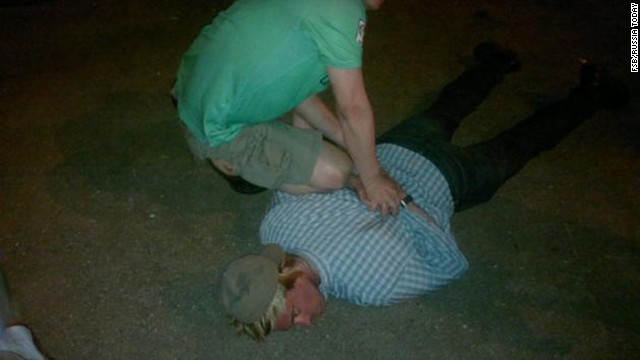 Russia's FSB counterintelligence
agency released photos after it said it briefly detained a suspected
member of the CIA who was trying to recruit a staff member of one of the
Russian special services. Pictured, the man is handcuffed on the
ground.
Russia's FSB counterintelligence
agency released photos after it said it briefly detained a suspected
member of the CIA who was trying to recruit a staff member of one of the
Russian special services. Pictured, the man is handcuffed on the
ground.
Moscow (CNN) -- Wigs, dark glasses, a compass and a large bundle of foreign cash -- it's the stuff of any Cold War-era spy novel.
That's the "spy arsenal"
Russia's counterintelligence agency says it found with a U.S. diplomat
when he was caught allegedly trying to recruit a Russian special
services staff member.
The diplomat in question,
Ryan Fogle, third secretary of the Political Department of the U.S.
Embassy in Moscow, was declared "persona non grata" Tuesday.
Russia's Foreign Ministry has demanded his "early expulsion."
Fogle was detained
overnight Monday to Tuesday "during an attempt to recruit a
representative of one of the Russian security services," the Foreign
Ministry statement said.
 Russia accuses U.S. diplomat of spying
Russia accuses U.S. diplomat of spying
He was briefly held
before being handed over to the embassy, following formal protocol,
Russia's counterintelligence agency, the FSB, said earlier.
"The 'spy arsenal' that
was found with him -- as well as a big sum of money -- not only expose a
foreign agent who was caught red-handed but also raise serious
questions for the American side," the Foreign Ministry said.
"While the presidents of
our countries reaffirmed their readiness to expand bilateral
cooperation, including the cooperation of intelligence agencies in
fighting international terrorism, such provocative actions in the spirit
of the 'Cold War' does not contribute to building mutual trust."
The U.S. diplomat had
"special technical devices, written instructions for the Russian citizen
being recruited, a large sum of cash and means of changing his
appearance," state news agency RIA-Novosti quoted the FSB as saying
earlier Tuesday.
An image released by the FSB shows what it says are his belongings, including two wigs, a knife, two pairs of dark glasses, a map and a compass.
Another shows what appears to be a large quantity of high-denomination euro currency notes.
The man, with short
brown hair and wearing a blue-and-white-checked shirt, is also pictured
apparently being detained by security in the street and seated at a desk
for questioning.
A photograph of the man's ID card released by the FSB identifies him as Ryan Fogle.
Nikolai Zakharov, a
spokesman for the FSB, said the Russian approached by Fogle was free and
that there were no charges or accusations against him.
The Russian report of
what happened makes the case sound closed, but a former FBI
counterintelligence officer cast doubt on that account.
"I very much doubt that a
highly trained CIA operative is going to be walking the streets of
Moscow wearing a really bad blond wig. It's poor trade craft, and it
looks like a setup to me," said Eric O'Neill.
He suggested that the
Russians likely planted the material on Fogle for dramatic effect,
perhaps to stir up anti-American sentiment, achieve a political
objective, or distract attention from some other matter.
The Russian Foreign Ministry said it had summoned U.S. Ambassador to Russia Michael McFaul for an explanation.
The embassy did not comment Tuesday.
U.S. State Department
spokesman Patrick Ventrell told reporters in Washington that an officer
at the Moscow embassy was briefly detained and released.
He declined to comment further.
It's not the first time
in recent years that Russia and the United States have traded claims
about alleged agents, in episodes reminiscent of the Cold War era.
In 2010, the two nations carried out a "spy swap" in Vienna.
The United States
exchanged 10 Russian agents who had been expelled for intelligence
gathering for four individuals who had been incarcerated in Russia.
Angelina Jolie undergoes double mastectomy
Angelina Jolie undergoes double mastectomy

Empowered patient: Angelina Jolie
"My doctors estimated
that I had an 87 percent risk of breast cancer and a 50 percent risk of
ovarian cancer, although the risk is different in the case of each
woman," Jolie wrote. "Once I knew that this was my reality, I decided to
be proactive and to minimize the risk as much I could. I made a
decision to have a preventive double mastectomy."
Jolie's mother, actress and producer Marcheline Bertrand, died of ovarian cancer in 2007 at the age of 56. Jolie is 37 years old.
In the Times op-ed, titled "My Medical Choice," Jolie said she finished three months of medical procedures at the Pink Lotus Breast Center in California on April 27 that included the mastectomies and reconstruction.

Writer: Public focus on Jolie's breasts

Jolie: 'I've decided to be proactive'
A mastectomy is an operation that removes all or part of the breast.
She wrote that her
experience involved a three-step process. On February 2, the actress had
a procedure that increases the chance that the nipple can be saved. Two
weeks later, she had major surgery where the breast tissue was removed
and temporary fillers were put in place. Nine weeks later, she described
undergoing "reconstruction of the breasts with an implant."
"There have been many advances in this procedure in the last few years," she said, "and the results can be beautiful."
"I wanted to write this
to tell other women that the decision to have a mastectomy was not easy.
But it is one I am very happy that I made," Jolie wrote. "My chances of
developing breast cancer have dropped from 87 percent to under 5
percent."
BRCA
stands for breast cancer susceptibility genes, a class of genes known
as tumor suppressors, according to the National Cancer Institute.
Mutations of the BRCA1
and BRCA2 genes have been linked to hereditary breast and ovarian
cancer. A blood test can determine if a woman is "highly susceptible" to
the cancers.
Fellow actress Christina Applegate had a similar procedure in 2008. She also had a mutation of the BRCA1 gene.
Jolie may be best known
for title role in the "Lara Croft" series of films, but she also won an
Academy Award for best supporting actress in "Girl, Interrupted." She
also received a Golden Globe Award and SAG Award for the same role.
Jolie serves as a special envoy for the United Nations High Commissioner for Refugees and has visited refugee camps around the world.
The actress has been in a
relationship with actor Brad Pitt since the mid-2000s, and they are
engaged. The couple has three biological and three adopted children.
 Celebrities and their battles with cancer
Celebrities and their battles with cancer
 Photos: Life of Angelina Jolie
Photos: Life of Angelina Jolie
In telling her story, Jolie acknowledged that surgery might not be the right choice for every woman.
"For any woman reading
this, I hope it helps you to know you have options," Jolie wrote. "I
want to encourage every woman, especially if you have a family history
of breast or ovarian cancer, to seek out the information and medical
experts who can help you through this aspect of your life, and to make
your own informed choices."
But for Jolie, the decision ultimately came down to her kids.
"I can tell my children that they don't need to fear they will lose me to breast cancer," she said.
Welcome to Naija Gist: Nigeria declares state of emergency
Welcome to Naija Gist: Nigeria declares state of emergency: Nigerian president declares emergency in 3 states during 'rebellion' Nigerian President Goodluck Jonathan declares a state o...
Nigeria declares state of emergency
Nigerian president declares emergency in 3 states during 'rebellion'
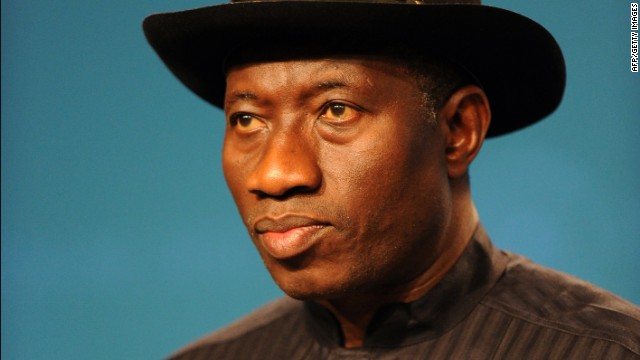
Nigerian President Goodluck Jonathan declares a state of emergency in Borno, Yobe and Adamawa in northeastern Nigeria.
The order, issued by
President Goodluck Jonathan, applies to Borno, Yobe and Adamawa states
in northeastern Nigeria. He also noted a rise of insurgent violence in
eight other states as well, including Nasarawa, where scores of police
officers were killed last week.

Obasanjo: Boko Haram undermine security
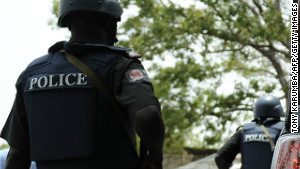
Workers abducted in northern Nigeria

2012: Who are Boko Haram?
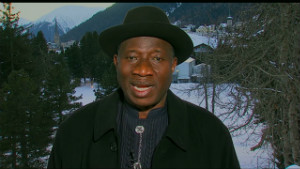 Nigerian president: Boko Haram 'threat'
Nigerian president: Boko Haram 'threat'
"We have taken robust
steps to unravel and address the root causes of these crises, but it
would appear that there is a systematic effort by insurgents and
terrorists to destabilize the Nigerian state and test our collective
resolve," Jonathan said in a televised speech.
Insisting they weren't
simply criminals, the president said "terrorist groups" were staging a
"rebellion and insurgency" that threatened Nigeria's "unity and
territorial integrity." Some northern parts of Borno state have already
been taken over by such groups, as Jonathan noted.
Such violence over the
years has been blamed on Boko Haram, whose name means "Western education
is sacrilege." According to Human Rights Watch, the group has killed
more than 2,800 people in an escalating campaign to impose strict
Islamic law on largely Muslim northern Nigeria.
Attempts at dialogue --
which will continue, the president said -- have failed to curb
militants' efforts "to progressively overwhelm the ... country." He
cited several recent examples of violence, including the killing of
"innocent civilians and state officials," attacks on government
buildings and facilities and the destruction of Nigeria's flag for
"strange flags" instead.
"These actions amount to a
declaration of war and a deliberate attempt to undermine the authority
of the Nigerian state and threaten her territorial integrity," Jonathan
said. "As a responsible government, we will not tolerate this."
The president said he'll
send more troops to the three states, adding that they and other
security forces there have orders to "take all necessary action." They
have the authority to detain suspects and those who illegally possess
weapons, take over any building "used for terrorist purposes" and
conduct searches.
"Those insurgents and
terrorists who take delight in killing our security operatives --
whoever they may be, wherever they may go -- we will hunt them down, we
will fish them out, and we will bring them to justice," Jonathan said.
"No matter what it takes, we will win this war against terror."
Subscribe to:
Comments (Atom)